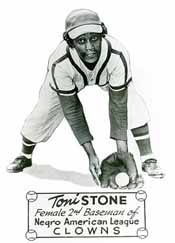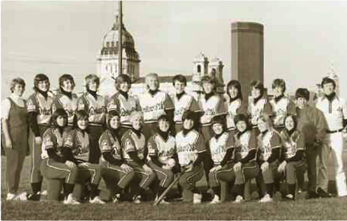Difference between revisions of "Avantis Softball Team"
| Line 27: | Line 27: | ||
|- | |- | ||
| Dunning Field served the [[Rondo Neighborhood]] long before [[Interstate 94]] erased it from the map in the 1960s. The neighborhood permitted a handful of talented young girls to participate in softball, baseball, and other sports. Notably, old Rondo was home to Toni Stone, a lifelong “tomboy” who became one of the first African-American women to play baseball professionally.<small>(3)</small> In many ways, Stone blazed a path for the Avantis a decade before the latter organized. | | Dunning Field served the [[Rondo Neighborhood]] long before [[Interstate 94]] erased it from the map in the 1960s. The neighborhood permitted a handful of talented young girls to participate in softball, baseball, and other sports. Notably, old Rondo was home to Toni Stone, a lifelong “tomboy” who became one of the first African-American women to play baseball professionally.<small>(3)</small> In many ways, Stone blazed a path for the Avantis a decade before the latter organized. | ||
| + | |||
| + | |||
A group of women organized into the Avantis in 1960,<small>(4)</small> eight years before Honey Harold opened [[Foxy’s Bar]] in Minneapolis. At the time, queer bars like the Happy Hour Bar (later a part of the [[Gay 90s Complex[[) or [[Sutton’s Place]] noticeably prevented women from sharing space with men. | A group of women organized into the Avantis in 1960,<small>(4)</small> eight years before Honey Harold opened [[Foxy’s Bar]] in Minneapolis. At the time, queer bars like the Happy Hour Bar (later a part of the [[Gay 90s Complex[[) or [[Sutton’s Place]] noticeably prevented women from sharing space with men. | ||
| + | |||
| + | |||
Revision as of 11:19, 24 March 2010
Dunning Field, St. Paul, MN
| The Avantis pose in front of the Minneapolis skyline, 1975. Note that the IDS Center is the only visible skyscraper. Courtesy of the Minnesota Historical Society and Betty Hawes. |
Though conceptually rooted in Minneapolis, the Avantis all-women softball team represented a greater relationship between queer women and sporting that is evident in the Twin Cities. Indeed, the team interchangeably referred to themselves as the Minneapolis Avantis and the Twin Cities Avantis.
|
| Dunning Field served the Rondo Neighborhood long before Interstate 94 erased it from the map in the 1960s. The neighborhood permitted a handful of talented young girls to participate in softball, baseball, and other sports. Notably, old Rondo was home to Toni Stone, a lifelong “tomboy” who became one of the first African-American women to play baseball professionally.(3) In many ways, Stone blazed a path for the Avantis a decade before the latter organized.
|
 Toni Stone, when she played for the Indianapolis Clowns, Courtesy of the National Baseball Hall of Fame's Library and Deborah Blagg. |
While the Avantis were visibly a queer women’s softball team, they were not vocally so—a second group, The Wilder Ones, became the first openly-queer women’s team in 1971.(6) The later team challenged the Minneapolis Park Board and set a standard for future relations between the City and queer sports teams.(7)
(1)Enke, Anne. Finding the Movement: Sexuality, Contested Space, and Feminist Activism. North Carolina: Duke University Press, 2007. Page 151.
(2)Enke, page 145.
(3)Sward, Susan. "Obituary: Toni Stone." The San Francisco Gate. 11/6/1996.
(4)Enke, page 151.
(5)Enke, page 145.
(6) Enke, page 156.
(7) Enke, page 157.
Part of Minneapolis/St. Paul, MN: 100 Queer Places in Minnesota History, (1860-1969), (1969-2010)
